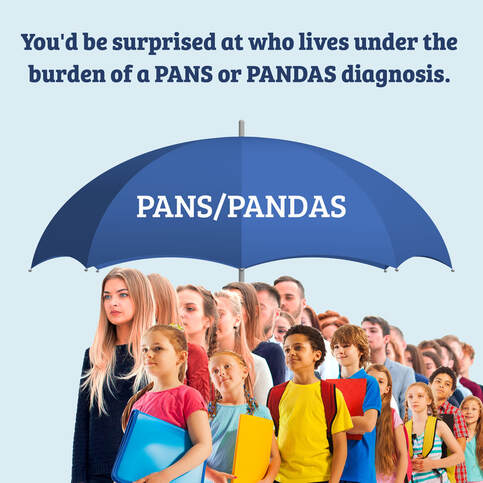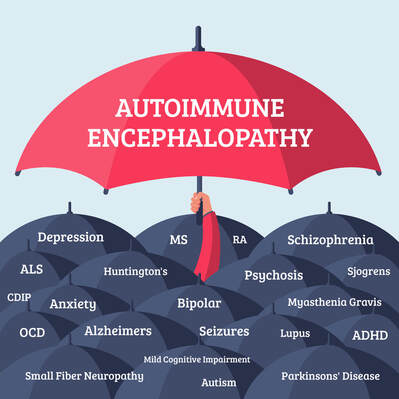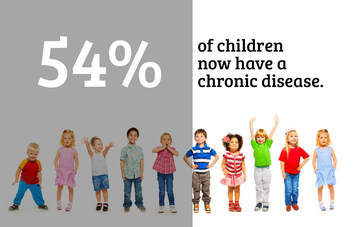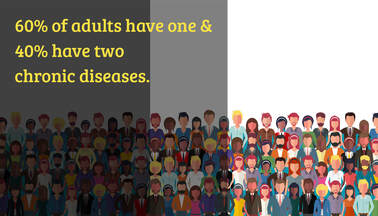Primary examples of this are Pediatric Acute-onset Neuropsychiatric Syndrome (PANS) and Pediatric Autoimmune Neuropsychiatric Disorder Associated w/ Streptococcal Infections (PANDAS), both of which can strike at ANY age. There are many instances where these disorders have been diagnosed outside the average age range of 3 to 13 years – which makes it even more critical to review all factors and signs on an individual basis and keep in mind the “umbrella” of autoimmune encephalopathy (AE). Understanding the umbrella of AE In seeking to identify a specific disorder or even concurrent disorders, it can be helpful to envision the idea of a big umbrella, one that encompasses a variety of patient issues that often present with an equally varied range of baffling symptoms. But essentially, this umbrella exists in reality as AE and can include a dizzying number of subset conditions The umbrella or scope of AE is not limited to just PANS or PANDAS. Rather, it includes a wide scope of other inflammation-based diseases such as attention deficit hyperactivity disorder (ADHD), obsessive-compulsive disorder (OCD), anxiety and depression, bipolar disorder or schizophrenia. Additionally, diagnoses like multiple sclerosis (MS), amyotrophic lateral sclerosis (ALS), seizures, myasthenia gravis and other neuromuscular presentations, Parkinson’s disease, Huntington’s disease, lupus and rheumatoid arthritis, autism and even migraine may all fall under that umbrella of AE.1 Given this span of disorders that can affect us in so many different ways makes it even more important to focus on improving the “immune terrain” in any neurological presentation. This immune terrain is our state of immune health and we have ample evidence that the brain cannot be healthy if the body is stricken with illness. As we’ve often noted, the global pandemic of autoimmune disease clearly is being driven by the toxicity of our environment. While some lifestyle factors that influence disease initiation may be modifiable in part, there are certain toxic impacts that have become part of our daily existence (e.g. industrial chemicals, air pollution, EMF exposure, etc.). Here are a few startling statistics2 along with a rising tide of neurodegenerative disease that unfortunately may be expected to increase post-COVID:
Start with the basics on every patient’s healing journey.
While each patient requires a protocol designed to address their individual health issues and needs, there are some basic steps on a path toward an anti-inflammatory lifestyle that focus on modifiable risk factors – remember that these recommendations will benefit you even in the absence of a known autoimmune disorder:
On treatment for this umbrella of autoimmune encephalopathy-related diseases. The autoimmune nature of most, if not all, neurodegenerative disease makes intravenous immunoglobulin (IVIG) a highly effective part of an integrative treatment protocol. We know that the mechanisms involved in IVIG can help to reset our immune terrain and in a recent study with PANS patients, for example, it’s been shown to offer a durability of response for many weeks.3 In light of the times in which we live, surrounded by so many impacts to our immune health, the action of IVIG is more valuable than ever before. In hope and healing, Dr. Suzanne Gazda References: 1 Autoimmunity plays a role in Parkinson's. https://www.sciencedaily.com/releases/2020/04/200420084255.htm; Alzheimer’s is an autoimmune disease.; https://www.j-alz.com/content/surprising-finding-provides-more-support-alzheimer’s-being-autoimmune-disease; Is Alzheimer’s an autoimmune disease? https://www.suzannegazdamd.com/blog/is-alzheimers-an-autoimmune-disease; Autoimmune disease and ALS; https://www.ncbi.nlm.nih.gov/pmc/articles/PMC3795611/; Rethinking concepts of autoimmune disease and migraine. https://www.sciencedirect.com/science/article/abs/pii/S0941950018302458; Huntington’s disease is a TH17-related autoimmune disorder against mutant Huntington coded by multiple CAG triplets. https://www.nature.com/articles/npre.2011.6129.1; Large study links autism to autoimmune disease in mothers. https://www.spectrumnews.org/news/large-study-links-autism-to-autoimmune-disease-in-mothers/; Immune dysfunction and autoimmunity as pathological mechanisms in autism spectrum disorders. https://www.frontiersin.org/articles/10.3389/fncel.2018.00405/full; Autoimmune disease and psychotic disorders. https://www.ncbi.nlm.nih.gov/pmc/articles/PMC6435494/; Why do I have MS? https://www.suzannegazdamd.com/blog/why-do-i-have-ms; Autoimmune encephalopathy. https://www.mayoclinicproceedings.org/article/S0025-6196(11)60228-0/fulltext 2 The significance of functional medicine. https://www.suzannegazdamd.com/blog/the-significance-of-functional-medicine 3 New study further supports IVIG therapy in PANS patients. https://www.suzannegazdamd.com/blog/new-study-further-supports-benefits-of-ivig-treatment-in-pans-patients Additional reading about IVIG: https://www.suzannegazdamd.com/blog/ivig-in-autoimmune-disease-therapies https://www.suzannegazdamd.com/blog/with-more-potential-uses-for-more-diseases-ivig-gains-enhanced-awareness-for-its-multimodal-properties
0 Comments
Your comment will be posted after it is approved.
Leave a Reply. |
AuthorDr. Suzanne Gazda, Integrative Neurology Archives
February 2024
Categories |




 RSS Feed
RSS Feed